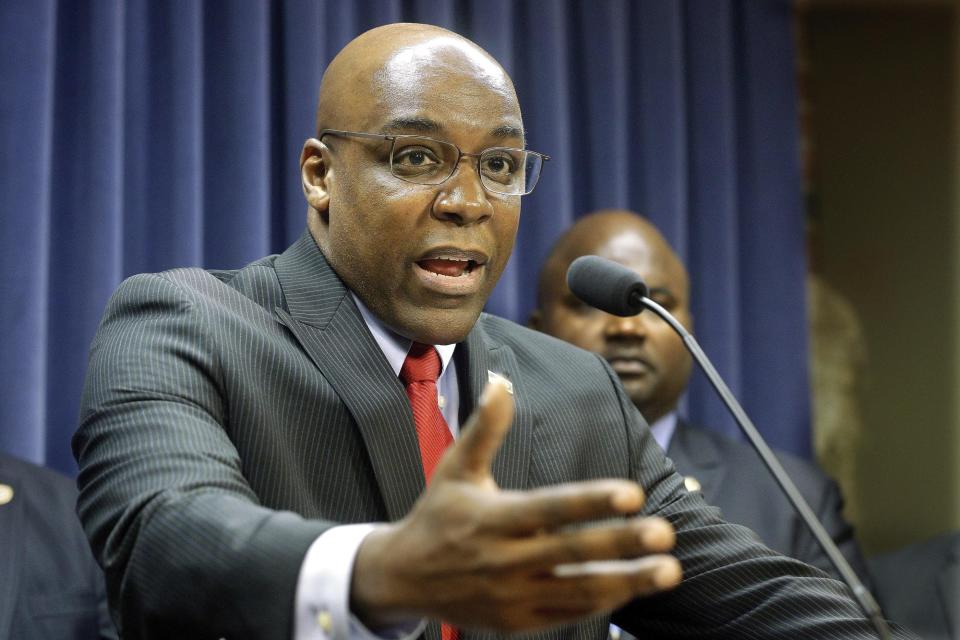SAFE-T Act cash bail provision set for oral arguments. What you should know about the appeal
![Illinois Supreme Court Building Springfield Friday April 22, 2022. [Thomas J. Turney/ The State Journal-Register]](https://s.yimg.com/ny/api/res/1.2/zkUCd0ssPfxb0ngYa9RUJg--/YXBwaWQ9aGlnaGxhbmRlcjt3PTEyNDI7aD03MjI-/https://media.zenfs.com/en/the-state-journal-register/d6798974647fc1e6d7db4f514c3efe93)
On Jan. 1, 2023 Illinois was set to end cash bail pretrial - becoming the first state in the nation to do so. That changed, however, following a December lower court ruling that delayed the implementation of the Pretrial Fairness Act.
The PFA, a provision of the criminal justice reform SAFE-T Act, would have kept judges from issuing cash bail before an individual has had a trial. Judges instead would have been able only to keep a person behind bars if they were deemed a danger to the community or seen as likely to flee prosecution.
Recent:Illinois Supreme Court issues stay on ending cash bail
The seven-panel Illinois Supreme Court is set to hear oral arguments Tuesday morning after the state appealed the ruling by a Kankakee County court. Here's what to know about the act and upcoming proceedings.
Timeline
Gov. JB Pritzker signed the nearly 800-page Safety, Accountability, Fairness and Equity-Today Act in early 2021 with several provisions going into effect that July. The act also required law enforcement agencies to have body cameras and updated training and use-of-force standards.
Several amendments followed, most recently becoming the major debate of the 102nd Illinois General Assembly veto session. Pritzker signed the amended version in December which received no Republican support, although some noted it was an improvement from prior versions.
At the same time, state's attorneys began filing lawsuits against the constitutionality of the SAFE-T Act. Those 60-plus attorneys, including Sangamon County state's attorney Dan Wright, eventually consolidated in Kankakee County with state's attorney James Rowe.
Local:Advocates and opponents of Pretrial Fairness Act in Illinois spar in local town hall
What are opponents saying?
At the heart of the prosecution's argument was the bill violated multiple guarantees listed in the state constitution. Rowe argued before Judge Thomas W. Cunningham that the state had violated the single-subject rule and three readings clause - the number of readings state legislators take to pass a bill.
The state constitution also states that all people in Illinois "shall be bailable by sufficient sureties." Rowe and Republican legislators during the veto session cited this as meaning a constitutional guarantee to cash bail. Republicans and several law enforcement agencies said ending cash bail could lead to an increase in crime throughout the state.
In his ruling, Cunningham, a Republican judge, found the bill violated the victim rights act and the separation of powers clause in the Illinois Constitution. He wrote in his opinion that lawmakers should have instead "submitted the question on the ballot to the electorate at a general election" if they wanted to make the changes.
What proponents say

When he signed House Bill 1095, the latest amendment to the SAFE-T Act, Pritzker expressed support for the needed changes while ensuring the major tenants had fought for remained in tack.
“I’m pleased that the General Assembly has passed clarifications that uphold the principle we fought to protect: to bring an end to a system where wealthy violent offenders can buy their way out of jail, while less fortunate nonviolent offenders wait in jail for trial,” said Pritzker in a statement.
Along with the governor, Attorney General Kwame Raoul, Senate President Don Harmon, and House Speaker Emanuel "Chris" Welch, were named in the lawsuit. Raoul announced plans to challenge the lower court's ruling soon after the decision was made and further clarified the bill's other provisions were still in place.
The defense said the elimination of monetary bail does not violate the constitution's bail clause, which it argues nonmonetary forms of bail are still permitted under the PFA. Cunningham's ruling that the act violates the victims' rights and separation of powers clauses also were contested.
How to tune-in
The oral arguments are scheduled to begin at 9 a.m. at the Supreme Court building on 200 E Capitol Ave. in Springfield.
Watch the livestream on the Illinois Supreme Court website under the March 2023 docket where a recording also will be available.
Contact Patrick Keck: 312-549-9340, pkeck@gannett.com, twitter.com/@pkeckreporter.
This article originally appeared on State Journal-Register: Illinois Supreme Court to hear state's appeal to cash bail ruling

